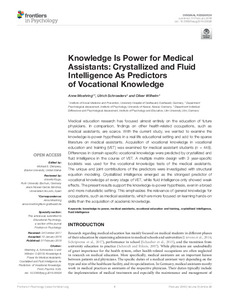| dc.date.accessioned | 2021-01-25T09:52:57Z | |
| dc.date.available | 2021-01-25T09:52:57Z | |
| dc.date.issued | 2018-02-01 | |
| dc.identifier | doi:10.17170/kobra-202101213019 | |
| dc.identifier.uri | http://hdl.handle.net/123456789/12440 | |
| dc.language.iso | eng | eng |
| dc.rights | Namensnennung 4.0 International | * |
| dc.rights.uri | http://creativecommons.org/licenses/by/4.0/ | * |
| dc.subject | knowledge-is-power | eng |
| dc.subject | medical assistants | eng |
| dc.subject | vocational education and training | eng |
| dc.subject | crystallized intelligence | eng |
| dc.subject | fluid intelligence | eng |
| dc.subject.ddc | 150 | |
| dc.title | Knowledge Is Power for Medical Assistants: Crystallized and Fluid Intelligence As Predictors of Vocational Knowledge | eng |
| dc.type | Aufsatz | |
| dcterms.abstract | Medical education research has focused almost entirely on the education of future physicians. In comparison, findings on other health-related occupations, such as medical assistants, are scarce. With the current study, we wanted to examine the knowledge-is-power hypothesis in a real life educational setting and add to the sparse literature on medical assistants. Acquisition of vocational knowledge in vocational education and training (VET) was examined for medical assistant students (n = 448). Differences in domain-specific vocational knowledge were predicted by crystallized and fluid intelligence in the course of VET. A multiple matrix design with 3 year-specific booklets was used for the vocational knowledge tests of the medical assistants. The unique and joint contributions of the predictors were investigated with structural equation modeling. Crystallized intelligence emerged as the strongest predictor of vocational knowledge at every stage of VET, while fluid intelligence only showed weak effects. The present results support the knowledge-is-power hypothesis, even in a broad and more naturalistic setting. This emphasizes the relevance of general knowledge for occupations, such as medical assistants, which are more focused on learning hands-on skills than the acquisition of academic knowledge. | eng |
| dcterms.accessRights | open access | |
| dcterms.creator | Möhring, Anne | |
| dcterms.creator | Schroeders, Ulrich | |
| dcterms.creator | Wilhelm, Oliver | |
| dc.relation.doi | doi:10.3389/fpsyg.2018.00028 | |
| dc.subject.swd | Wissen | ger |
| dc.subject.swd | Macht | ger |
| dc.subject.swd | Medizinisches Personal | ger |
| dc.subject.swd | Berufsbildung | ger |
| dc.subject.swd | Intelligenz | ger |
| dc.type.version | publishedVersion | |
| dcterms.source.identifier | EISSN 1664-1078 | |
| dcterms.source.journal | Frontiers in Psychology | eng |
| dcterms.source.volume | Volume 9 | |
| kup.iskup | false | |
| dcterms.source.articlenumber | Article 28 | |


